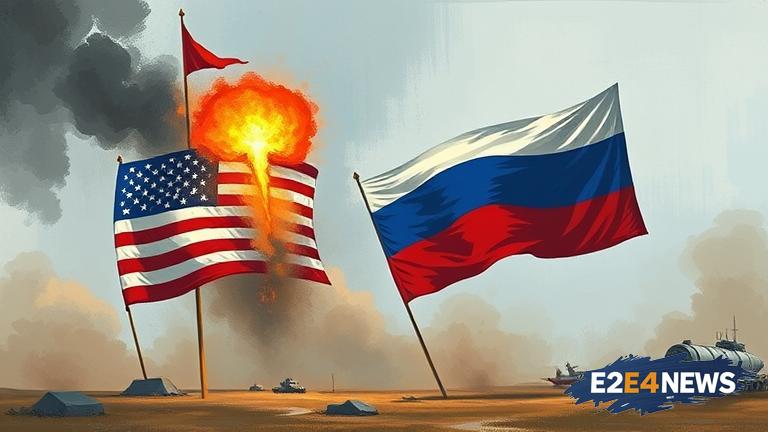Russia has announced its withdrawal from the Intermediate-Range Nuclear Forces Treaty (INF) with the United States, marking a significant escalation in tensions between the two nations. The move comes after the US deployed a submarine to the region, which Russia claims is a violation of the treaty. According to Russian officials, the withdrawal is a direct result of the actions of Western countries, which have been accused of undermining the treaty. The INF treaty, signed in 1987, banned the development and deployment of ground-launched missiles with ranges between 500 and 5,500 kilometers. However, the US has accused Russia of violating the treaty by developing and deploying a new cruise missile, which Russia has denied. The US has also been critical of Russia’s actions in Ukraine and its alleged meddling in the 2016 US presidential election. The withdrawal from the treaty has sparked concerns about a new arms race between the two nations. Russia has stated that it will no longer be bound by the treaty’s restrictions and will develop new missiles in response to the US’s actions. The US has also announced plans to develop new missiles, citing the need to counter Russia’s alleged violations of the treaty. The move has been met with criticism from European leaders, who have expressed concerns about the potential consequences of a new arms race. The United Nations has also called for calm and urged both nations to return to the negotiating table. The withdrawal from the treaty is the latest in a series of escalating tensions between Russia and the West. Russia has been accused of a range of aggressive actions, including the annexation of Crimea and the support of separatist rebels in eastern Ukraine. The US and its allies have imposed sanctions on Russia in response to these actions, which has led to a significant deterioration in relations between the two nations. The INF treaty was seen as a key component of the post-Cold War era, and its collapse has sparked concerns about a return to the tensions of the past. Russia has stated that it is willing to negotiate a new treaty, but only if the US agrees to ban the development and deployment of all missiles, including those launched from submarines and aircraft. The US has rejected this proposal, citing the need to maintain its military capabilities in the face of Russian aggression. The situation remains volatile, with both nations engaging in a war of words and accusing each other of escalating tensions. The international community is watching the situation closely, with many calling for calm and urging both nations to return to the negotiating table. The collapse of the INF treaty has significant implications for global security, and the consequences of a new arms race are still unknown. As tensions continue to escalate, the world waits with bated breath to see what will happen next. The US and Russia have a long history of tensions, dating back to the Cold War era. The two nations have been engaged in a series of proxy wars and diplomatic battles, with the latest escalation being the most significant in recent years. The international community is urging both nations to engage in diplomatic efforts to resolve their differences and prevent a new arms race. The situation is complex, with multiple factors at play, including the role of other nations such as China and Europe. The US and Russia must navigate these complex geopolitics in order to find a resolution to the crisis. The world is watching as the situation unfolds, with many wondering what the future holds for global security. The INF treaty was a landmark agreement that helped to reduce the risk of nuclear war, and its collapse has significant implications for the future of international relations. The US and Russia must work together to find a new path forward, one that prioritizes diplomacy and cooperation over escalation and aggression.





